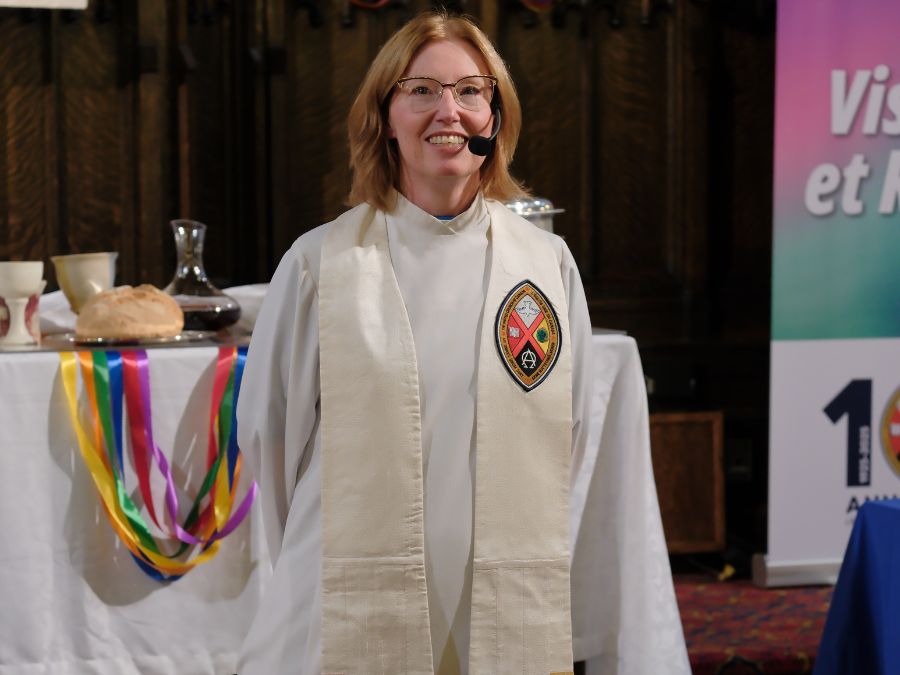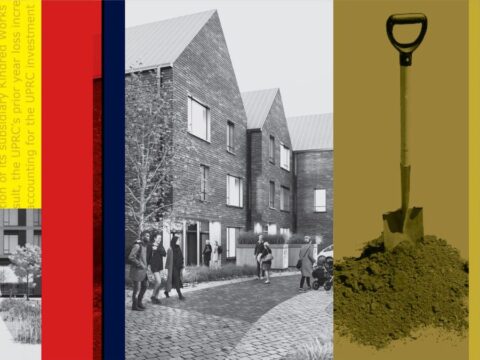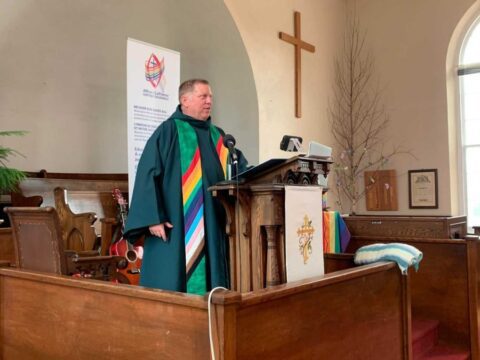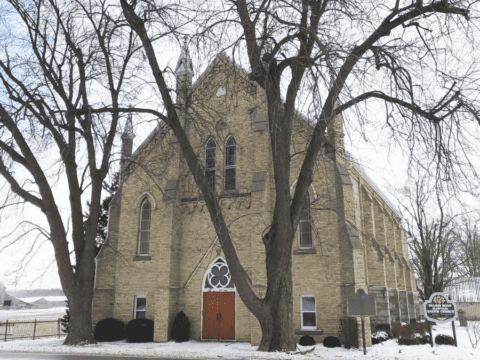At a worship service in Calgary on Aug. 11, Rt. Rev. Kimberly Heath was installed as the 45th moderator of The United Church of Canada. In a pool of five nominees for the job, she was elected in three ballots. Her leadership comes at a time when the denomination is projecting a 65-percent membership decline by 2035 — while making plans to ensure its future. A longtime congregational minister from Brockville, Ont., Heath encourages the United Church to lean into its smallness. She spoke with Broadview about that call and her hopes for the denomination.
Emma Prestwich: How does it feel to be elected moderator?
You may unsubscribe from any of our newsletters at any time.
Kimberly Heath: It feels exciting. It feels a little bit daunting and overwhelming, but I guess it’s an affirmation of the call that began sort of gently in the last few years, and then strongly back in early December, that it just kind of started to take hold. If God has called me into it, then somehow God will take me through it.
EP: What would you say is that call or nudge for the church at this time?
KH: It’s kind of a critical time, both in the world and in the church, right? It would be nice if, as all hell was breaking loose around the world, if the church was feeling extremely robust and just ready to take it on and solve all the problems. Or, the other way around: if we were declining and struggling in a number of areas, but the world’s reasonably decent. But it’s not how it works, right? I’m probably projecting slightly, but there’s a lot of fatigue in the church right now. There’s a lot of weariness and feeling like, ‘How are we going to carry on, let alone help with so many of these big things in the world?’
The call that I am sensing is that we need to go deeper into our faith and not rely on our own strength, but find that deep well of “come all you who are thirsty, come and buy wine and bread without cost.” That idea that it’s leaning on the grace of God, and that it’s in that power that we do what God calls us to do … we tune in to God’s vision and God’s dreams. I think that the church needs to recognize that their faithfulness is enough. They are doing enough, and to trust that all they offer will not be wasted, that God will continue to use it as we go forward.
Look at me. This church loves their firsts, [but] I joked last night about how I’m not even the first ginger female moderator. I’m just some ordinary person from Brockville, Ont. But for some reason, the church has called somebody ordinary. God has called somebody very ordinary. And God uses that which is small and ordinary to do extraordinary things.
EP: Do you think the church needs to change how it’s operating to become more aligned with what God has planned?
KH: I think that the structure of the church has to follow where the Spirit is moving and not the other way around. How you do that is another story. I don’t have strong answers on particular structural things that need to change, but somehow, we need to change so that we can follow the Spirit. And seeing yesterday in the [General Council 45] court, we had a big youth presentation, and they want to be present. They want their voices heard. And so again, it’s like the Spirit is moving in that. How do we make the structure work so that they can have a stronger voice in our church? Same with les ministères en français, and there is life in the Francophone church community. And so again, how do we say, okay, there’s the spirit, there’s the life. Let’s empower and support it.
EP: How do you address the disconnection that some congregations are feeling from the national United Church?
KH: Yeah, that really is a huge issue. And in the proposals that have come before the General Council, you can see this feeling of disconnection. Is the General Council doing something wrong? I don’t know. How can they — we — do better? It’s a good question.
When I have been able to connect in community, it has made a massive difference to me. In fact, it was a clergy retreat that our region sponsored back in November or December, and I remember thinking, ‘I don’t have time for this; it’s probably not going to be that great.’ And it was such a wonderful time to be together! That made me feel connected, not necessarily to the decisions that come out of General Council. But when you feel supported by the region in collegiality, it strangely does help you to feel connected. So that might be something that I would encourage.
More from General Council 45:
- United Church apologizes to 2SLGBTQIA+ people in moving service
- Indigenous Church proposal sparks emotional debate to close out General Council 45
- United Church projects losing 65% of members in the next decade
EP: You have talked a lot about the need for the church to accept its smallness. What would that look like for an ordinary congregation?
KH: I’ve been in congregational ministry for my entire career. We get gazillions of emails from the national church or the region, and there’s a big feeling of ‘should,’ — like, we should do this, or we should raise up this issue. And you can just start to feel overwhelmed by it all. And I think rather than constantly feeling guilty, or ‘shoulding’ on ourselves, that smaller churches need to embrace who they are.
There’s a little church north of Brockville, Addison United. They haven’t had a minister in ages, but they have this coffee connection that they do every week. I think community is so critical right now. People are lonely and starved for genuine connection. And little churches can do that. That’s not hard.
EP: Do you have a message for congregations that may close in the next 10 years?
KH: It is really hard and really painful. My first settlement charge is no longer open, and its partner congregation doesn’t have a whole lot of people attending it either. There’s a massive demographic change that’s happening now. Even my congregation, Wall Street, is a pretty thriving congregation in the United Church. But if I were to ask everybody over the age of 75 to leave the room, there wouldn’t be so many people left.
I really believe in my heart that it’s not the end, that even if little communities and big communities of faith close, that it’s not the end of the Church of Jesus. It’s like we’re in a late fall season, and winter may well be coming, but there’s still a spring that’s coming. Their faithfulness and their work — nothing of good disappears. We just have to trust that we’re part of something bigger, and trust that in the same way that Jesus went to and through a cross and into resurrection, that that’s coming for our church. Now, it may not be in our lifetime.
EP: Do you have a message of encouragement to the church as you start this journey?
KH: I had a little moment of, I don’t know what the word was — panic — before I knew, when it was still myself and [moderator nominee] Rev. Samuel Dansokho and the vote had just been called. And I had a little moment of overwhelm and thinking, ‘How could I possibly speak to the issues of Palestine? How could I possibly speak to the issues of the apology to the 2S and LGBTQIA individuals? How could I possibly speak to the Indigenous Church?’ I just felt like I’m not enough to do this, and then I remembered that I didn’t have to be — there are individuals, little lights all across our church, shining in the night sky to bring life and hope. It’s not all on me; it’s not all on you. But together, we will be a light — you are the light of the world.
This interview has been condensed and edited for clarity and length.
***
Emma Prestwich is the digital and United Church in Focus editor at Broadview.














While I only knew of one moderator candidate (I did a book study on John Pentland’s book Fishing Tips a few years ago), I did watch each of the video postings of the candidate messages to the assembly. I congratulate each of them for putting their name forward and for their words to address the needs of the church. It is not always easy to stick one’s neck out! At this stage, I am hopeful that the new moderator, Rev. Dr. Kimberly Heath, will champion the work of the church in what I suggest are very challenging times. Once she was announced and her PhD dissertation was made available via Broadview, I read through the main body in short order and found it of considerable interest (preaching), perhaps as much because it is an interest of mine. I also found the anecdote that she shared of the time that her father (the former lead minister at her current church) had to preside over the funeral of a young fellow killed in an accident, and in choosing the music he picked two familiar hymns, or at least he thought that they were familiar to all, perhaps most notably a group of younger folks. Not so. The first hymn was known to all (Amazing Grace) but the other not at all (can’t recall it, but it is a well-known hymn to most ‘older folks’). As he drove away, he contemplated what had taken place. It was clear that the church message was not reaching the younger demographic and things needed to change if they were to be embraced. I don’t know all that he did in that regard, but I must say that I quite agree with his conclusion. We must adapt to a new future and one that will continue to evolve. No, I am not saying that we should throw the baby out with the bathwater, but rather to recognize that the bathwater is a bit cool and needs some refreshing. The future of the church does look a bit bleak, and the survey presented to the 45th session in Calgary emphasized that point clearly, but let’s not turn out the lights just yet. If we are resigned to such an inauspicious fate, then I feel badly for Rev. Heath as our moderator. How discouraging would that be?!!!
As always, thank you for your life and work. Broadview matters.
Kimberly said: “…it’s leaning on the grace of God, and that it’s in that power that we do what God calls us to do … we tune in to God’s vision and God’s dreams. I think that the church needs to recognize that their faithfulness is enough. They are doing enough, and to trust that all they offer will not be wasted, that God will continue to use it as we go forward.”
I say Amen to her first two sentences. It rings true for me. It is her third sentence that got me thinking. Let me explain.
To me, for we who are modern progressive protestants, leaning on God’s grace entails not just slowing down, but stopping. We need to face and abandon our unconscious and deeply modern commitment to the view that “repairing the world” and fixing, solving the problems of our modern world are the same thing. The question must be asked, “faithful to what?”
Modernity is faithful to modernity. As the quintessential modern Canadian church are we in the UCC more faithful to modernity than we are to God? Might faithfulness today entail a trajectory change for modern Protestant churches? What if our modern understanding of what being faithful entails is passé in the imagination of God? What if God cheers the fact that younger folks see our modern progressive religion as not even interesting. What if leaning into God’s grace entails a Holy Saturday? An end to the modern religious life we have known?
What if Kimberly’s last sentence is misplaced? Not that God cannot redeem our efforts, but that in 2025 our taken-for-granted understanding of faithfulness and what it entails is no longer adequate? What if “to go forward” we need to stop, to risk getting knocked off our high horses, experiencing the fact that as we now are we cannot see what God wants us to see, and leaning into God’s grace in order to learn to see anew?
The irony, of course, is that if Kimberly had not spoken as she did, I would not have explored the possibility sketched above. Further, evidence that God can work with what we offer.